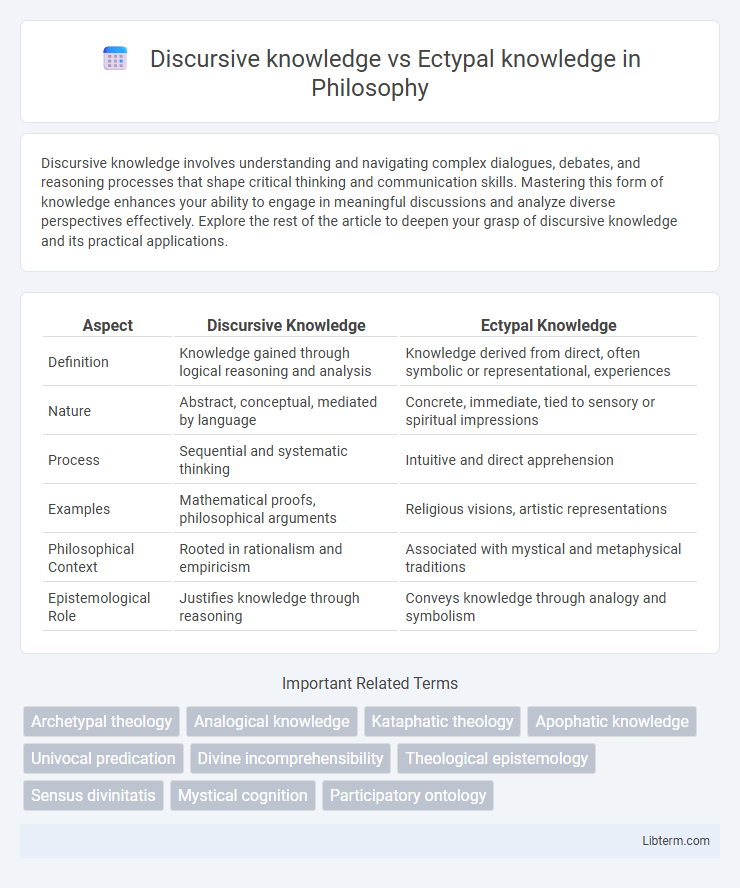Discursive knowledge involves understanding and navigating complex dialogues, debates, and reasoning processes that shape critical thinking and communication skills. Mastering this form of knowledge enhances your ability to engage in meaningful discussions and analyze diverse perspectives effectively. Explore the rest of the article to deepen your grasp of discursive knowledge and its practical applications.
Table of Comparison
| Aspect | Discursive Knowledge | Ectypal Knowledge |
|---|---|---|
| Definition | Knowledge gained through logical reasoning and analysis | Knowledge derived from direct, often symbolic or representational, experiences |
| Nature | Abstract, conceptual, mediated by language | Concrete, immediate, tied to sensory or spiritual impressions |
| Process | Sequential and systematic thinking | Intuitive and direct apprehension |
| Examples | Mathematical proofs, philosophical arguments | Religious visions, artistic representations |
| Philosophical Context | Rooted in rationalism and empiricism | Associated with mystical and metaphysical traditions |
| Epistemological Role | Justifies knowledge through reasoning | Conveys knowledge through analogy and symbolism |
Understanding Discursive Knowledge: Definition and Features
Discursive knowledge refers to the structured, language-based understanding derived from logical reasoning and explicit articulation of concepts, often formalized through discourse or written communication. It is characterized by clarity, coherence, and systematic presentation, enabling individuals to analyze, explain, and convey complex ideas in a sequential manner. This form of knowledge contrasts with ectypal knowledge, which involves intuitive or embodied comprehension, emphasizing the importance of symbolic representation and mental models in cognitive processing.
Ectypal Knowledge Explained: Origins and Characteristics
Ectypal knowledge originates from the concept of knowledge as a reflection or copy of a divine or ideal archetype, emphasizing its derivative and participatory nature in contrast to direct, discursive reasoning. Rooted in Christian Neoplatonism, ectypal knowledge is characterized by its imperfect but meaningful engagement with truth, mediated through sensory experience or revelation rather than purely rational deduction. This form of knowledge highlights the epistemological humility inherent in recognizing human understanding as finite and contingent upon higher, transcendent realities.
Historical Context of Discursive vs Ectypal Knowledge
Discursive knowledge, rooted in systematic reasoning and linguistic expression, historically emerged during the Enlightenment as a foundation for scientific and philosophical inquiry. Ectypal knowledge, often associated with experiential and intuitive understanding, traces back to pre-modern and indigenous epistemologies emphasizing direct, non-conceptual cognition. The historical context highlights discursive knowledge's dominance in Western intellectual traditions, contrasting with ectypal knowledge's preservation in alternative cultural and spiritual frameworks.
Key Differences Between Discursive and Ectypal Knowledge
Discursive knowledge involves reasoning through logical sequences and structured argumentation, emphasizing conscious, analytical thinking processes, often seen in scientific or philosophical contexts. Ectypal knowledge, derived from the term "ectype," represents knowledge as a reflection or copy of a higher, original form, focusing on intuitive, experiential understanding linked to archetypal or metaphysical realities. Key differences lie in discursive knowledge's reliance on explicit, propositional content and critical examination, whereas ectypal knowledge emphasizes implicit, symbolic insight rooted in a transcendental source.
Philosophical Foundations of Knowledge Types
Discursive knowledge, rooted in logical reasoning and structured argumentation, represents knowledge acquired through language and conceptual analysis, foundational in analytic philosophy. Ectypal knowledge, often linked to phenomenology and metaphysics, refers to knowledge as an imperfect copy or representation of an ideal or archetypal reality, emphasizing the distinction between appearance and essence. The philosophical foundations of these knowledge types explore epistemological boundaries between mediated understanding and direct acquaintance with underlying truths.
Examples of Discursive Knowledge in Everyday Life
Discursive knowledge in everyday life includes understanding how to follow recipes, solve mathematical problems, and engage in structured debates or discussions, showcasing logical reasoning and sequential thinking. This type of knowledge emphasizes verbal or written information processing, such as learning grammar rules or analyzing legal documents. Unlike ectypal knowledge, which relates to intuitive or experiential understanding, discursive knowledge depends on explicit, articulated concepts and systematic exploration.
Ectypal Knowledge in Theology and Metaphysics
Ectypal knowledge in theology and metaphysics refers to a secondary understanding derived from the original divine ideas or archetypes, emphasizing the finite intellect's grasp of infinite realities through analogical or participatory cognition. Unlike discursive knowledge, which proceeds step-by-step through logical reasoning and empirical observations, ectypal knowledge acknowledges the dependence of human knowing on the exemplary intellect of God, framing human epistemology within a participative, hierarchical metaphysical structure. This concept is crucial in classical theism, where human knowledge is seen as a reflection or 'image' (ectype) of divine truth, highlighting the limits and nature of finite cognition in relation to the absolute.
Significance in Epistemology: Why the Distinction Matters
Discursive knowledge, characterized by reasoning and propositional understanding, contrasts with ectypal knowledge, which involves intuitive or direct cognitive grasp of an archetype or idea. The distinction matters in epistemology because it highlights different ways of knowing: discursive knowledge relies on inferential processes and linguistic articulation, while ectypal knowledge accesses deeper, often non-discursive insights foundational to other knowledge forms. Recognizing this difference enables a more nuanced analysis of justification, truth, and the limits of human cognition in the theory of knowledge.
Implications for Modern Education and Learning
Discursive knowledge, grounded in logical reasoning and structured language, fosters critical thinking and analytical skills essential for academic development, while ectypal knowledge, based on mental representations and intuitive understanding, enhances creativity and holistic learning. Modern education benefits from integrating discursive approaches with ectypal methods to accommodate diverse cognitive styles and promote deeper comprehension. Emphasizing both forms encourages adaptive learning strategies that prepare students for complex problem-solving and innovation in evolving educational environments.
Bridging Discursive and Ectypal Knowledge: Future Perspectives
Bridging discursive and ectypal knowledge involves integrating structured, analytical reasoning with intuitive, non-discursive understanding to create comprehensive cognitive frameworks. Emerging methodologies in cognitive science and artificial intelligence emphasize hybrid models that leverage both knowledge types to enhance decision-making and problem-solving capabilities. Future research aims to develop adaptive systems capable of seamlessly transitioning between discursive and ectypal modes, optimizing learning and innovation across diverse domains.
Discursive knowledge Infographic

 libterm.com
libterm.com